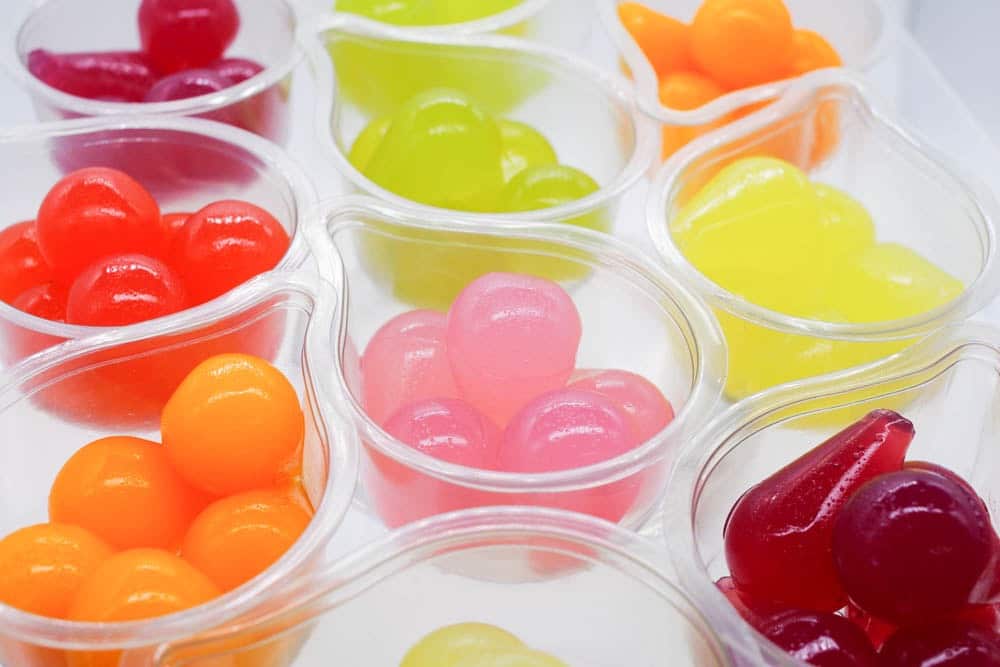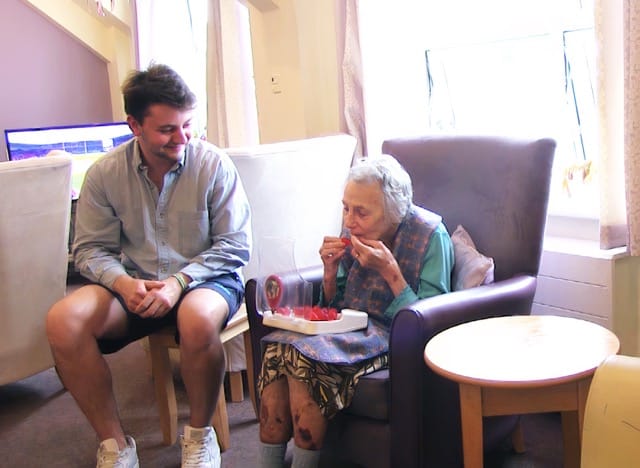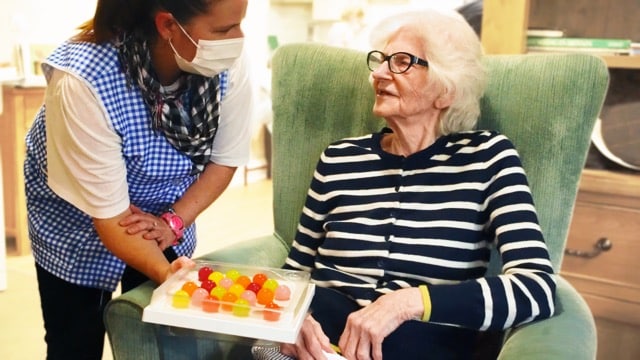After Lewis Hornby’s grandmother was rushed to the hospital with dehydration, he invented something to help her stay healthy: Jelly Drops, colorful candies that are 95 percent water. Dementia experts say he’s onto something.
Lewis Hornby’s grandmother Pat was living in a residential care facility in the United Kingdom when she was rushed to the hospital and his family was told to expect the worst.
Once at the hospital, they realized she was dehydrated.
“Thankfully, after 24 hours and IV fluid, she made a full recovery and was back to her happy self and went on to enjoy a good quality of life for years after,” Hornby said.

Her experience got Hornby, then a postgraduate design student, thinking about how he might be able to help his grandmother and other people living with dementia avoid dehydration — a common cause of hospitalization.
As his graduation project from his program at Royal College of Art at Imperial College London, he came up with a colorful sweet called Jelly Drops. Comprised of 95 percent water, the gelatinous candies are designed to be easy to eat — not to mention enticing — for older adults. His main goal, however, was that these sweet treats serve as a way to help people living with dementia avoid dehydration.
“It’s a format that people engage with independently and in a dignified way as well,” Hornby said. “They’re just sweets that anyone can enjoy. It just happens to be designed for people with dementia in mind.”
For people living with dementia, as for anybody, hydration is important for body organ function, regulating body temperature and preventing infection, according to Julie Green, deputy clinical lead of Dementia UK. But because of cognition issues, people with dementia are particularly at risk. Somebody living with dementia might not recognize when they are thirsty. They might not be able to communicate if they are thirsty, or they may forget to drink, Green said.
To start, Hornby spoke with caregivers and dementia psychologists. Then he left London and went north to Yorkshire, where he spent about a month in his grandmother’s care home. While there, he noticed that people tended to have a bit more independence with food, especially finger foods.

“It seemed more intuitive for people,” he said. Sweets especially got people more engaged, he noted. “Generally I’d go around the care home and most of the residents would ignore me which is fair enough,” he said. “But if I had a box of chocolates, I’m everyone’s best friend.”
Another benefit, he said, is that there’s a social element to enjoying sweets. People living with dementia and caregivers or family members can enjoy them together.
Hornby experimented. He tried presenting foods in a set up similar to a sushi bento box. Early on, the sweets were cubes, which weren’t very familiar to residents. When he brought his grandmother the round Jelly Drop prototypes, he knew he’d hit on a good format. She ate seven in 10 minutes.
“It was really great,” Hornby said. “I thought, you know, maybe I’m onto something”
The idea took off. He posted a video online of his grandmother eating the sweets and within a few weeks, the video had 100 million views, he said. Hornby was still making Jelly Drops in his student kitchen when he started getting inquiries from around the world. With support from the Alzheimer Society’s Innovation Accelerator Programme, he was able to launch Jelly Drops in the UK about a year and a half later, in 2020. They became available in North America in April.
They’re not designed to replace liquids — a tray contains 10 ounces of water, so slightly more than a cup. But they’re enough that they can help people avoid dehydration, said dementia care expert Teepa Snow.

“These things provide that little extra bump that might keep you out of the emergency room or out of that high-risk category,” Snow said.
According to Snow, Jelly Drops can be particularly helpful for people living with dementia who have difficulty processing thin liquids. For some people, the brain stops the sequence that prevents liquids from entering the airways, so there’s a risk of substances like water getting into their lungs, causing issues like infection. Other people may just not like drinking, or not have a sense of thirst.
She noted that they’re also appealing: In a rainbow of six colors, they look interesting, and they have pleasant fruit flavors. On the other hand, water can be difficult for people with dementia to notice because it is clear, and depending on a person’s motor skills, drinking it independently can be challenging.
The social aspect is also a plus, Snow said. They can enjoy them with their grandkids, for instance. People living with dementia may be irritated if caregivers nag them to consume liquids, but eating the Jelly Drops is a bit more playful or like snacking.
There are limitations, Snow said. This type of food isn’t appropriate for all people at all stages of dementia. Even in earlier stages, not everyone is capable of picking the sweets up and feeding themselves. Some people may not enjoy the flavor. And there is a cost: At $9.99 per 24-candy tray, a box of jelly drops is certainly more expensive than drinking a glass of water.
However, Snow said that the Jelly Drops are a useful tool that can help people avoid dehydration.
“It’s an option,” she said, “and I think that what we’ve missed up to now is having really good options for people,” Snow said.






The jelly sweets seems a great idea. Is there anywher in South Africa where we can buy these, neat Pretria or zjohannesburg. Tnx Riekie
Where can I purchase these Jelly Drops? On line? I live in the USA… is there a store? My sister has dementia that seems to be getting worse. She doesn’t want to drink many fluids? Please advise me…
Hi Toni, sorry to hear about your sister. You can find the link to the Jelly Drops website here: https://www.jellydrops.com/ . Thanks for reading!